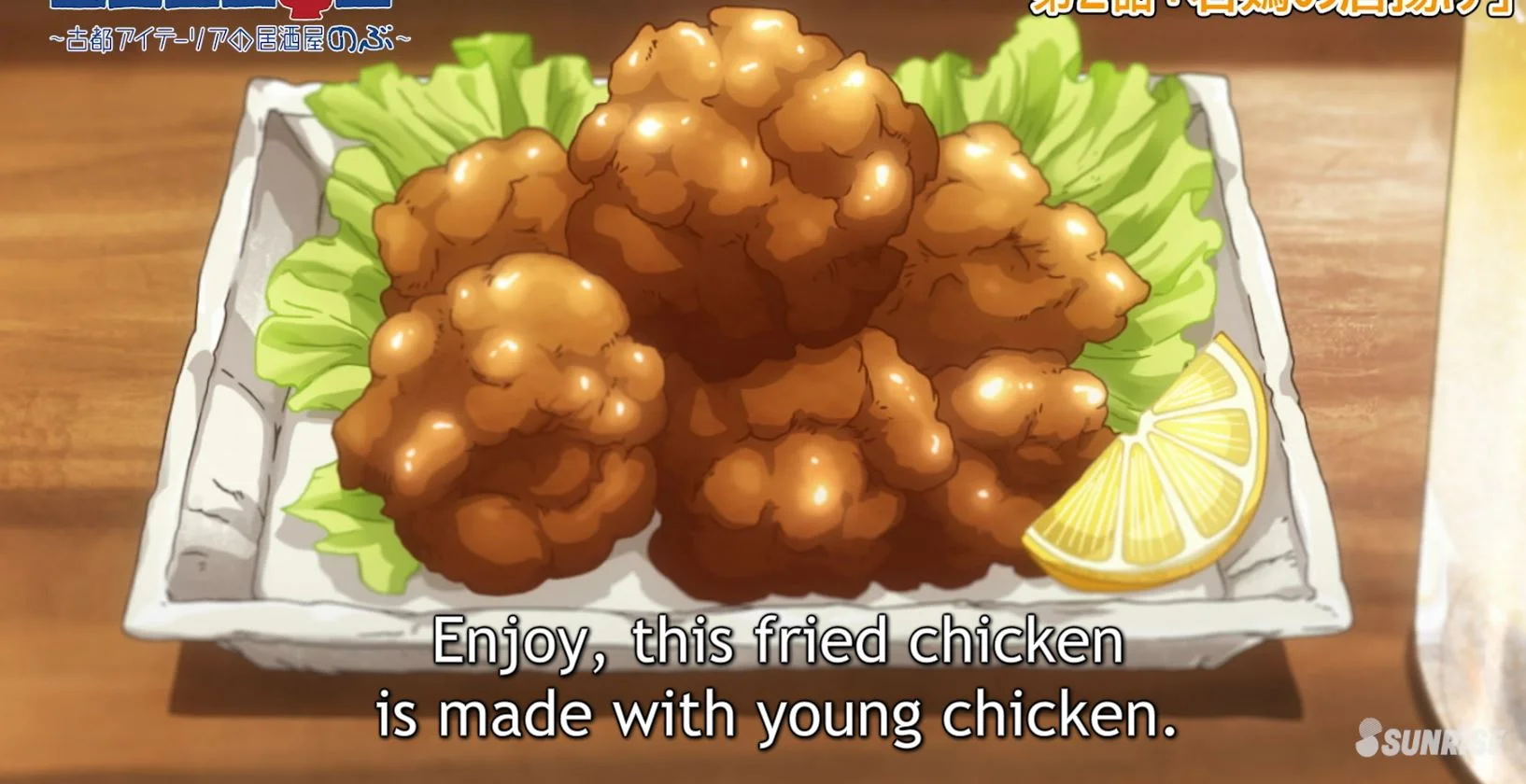Samurai Gourmet: A Catastrophic Review

Freedom Is a complicated concept. Too often, we only think of it in purely positive terms, forgetting the issues that arise from it. Freedom to act is a freedom to fail. And when all you’ve known is the cage, how can you hope to navigate the sky? Why Hello There, I’m Jon O’Guin, and this is Kitchen Catastrophe. Today, we’re going to do a Catastrophic Review of a brand-new Netflix show: Samurai Gourmet.
Samurai Gourmet is not, as my heavy-handed philosophy of the opening lines may have made you guess, a drama. Quite the opposite, Samurai Gourmet might be one of the deftest comedies I’ve seen. By which I mean the show will not make you grab your gut with laughter. It will also not step on your sensibilities. The show is too genuine for that. So let’s jump into a quick review of the first three episodes, and show you what’s waiting for you at the bottom of the miso bowl.
Looks like scallions.
I order from the O-Tak-Out Menu
The first thing you need to understand about Samurai Gourmet is this: this is not a cooking show. It’s not a travelogue, or a competition. You will not learn the secrets of Japanese cuisine from this show. You will only learn the secrets of a single, sixty-year-old man. So, you know, high stakes here.
The second thing you need to understand is that it is based on a slice of life manga, as the last sentences of the previous paragraph alluded to, and it owns that fact like it bought it with blood diamonds. If you’re not familiar with the more avant-garde theatre, or Japanese Manga, let me illuminate you: Slice of Life storytelling is, in a way, “story without plot”. Like Seinfeld, but, you know, with respect to other human beings.
This protest is based on lies and idiocy.
The basics of the show are laid out at the start of every episode: This is the story of a recently retired man, who, in need of something to occupy his time, has started eating out more. And is overcoming his own prejudices, beliefs, and fears, in tiny ways. He is aided in this journey by a masterless samurai. By which we mean, ‘whenever he’s in a tough spot, he thinks “What Would A Badass Ronin Do?” and does the tamer version of that, because he’s an old man, come on, he can’t go whole hog.”
Slice of Life stories have a unique issue: the stakes are, quite often, ridiculously low. The conflict of the first episode is “Do I have the moral courage to order a beer with my lunch, or am I too afraid the other people at this restaurant will judge me?” The second episode’s core is “I’ve made a terrible mistake. This is a bad restaurant. Oh god, what do I do?” The third is “Man, isn’t breakfast great?”.
So great.
And this can be very hard to get an audience to buy into. When the cost of failure is 10 minutes of feeling ashamed, why should we care? And that’s the unique beauty of the slice of life anime: it’s a mirror to your own life. It takes a special kind of person to order a meal, take three bites, and demand a refund. And historically, we don’t tend to think of them as “heroes”. How many lackluster meals have YOU eaten, hunched and silent, eating just enough to feel you weren’t insulting the cook, before fleeing, swearing to never dine at that place again? If the cost of action was 10 minutes of shame, why didn’t YOU leave?
For such a pin-point focus, the show lives and dies on one thing: the main character. And actor Naoto Takenata’s portraly of main character Kasumi is…perfect. Perfect in a way that’s almost insulting. The closest I can think of to it is Robert Downey Jr’s portrayal of Iron Man. RDJ comes out, and is so Tony Stark that almost every scene feels like he’s improvising it on the spot. Naoto doesn’t feel that way. Because Tony feels like he’s constantly performing. And with Samurai Gourmet, it feels that degree more natural: it feels like he’s not performing at all.
This is exactly what I expect a shy, startled man to look like when a samurai walks into the room.
Freedom’s Just Another Word For Nothing Left to Lose
There’s another thing this show will display: food porn. Glorious, soft-focused food porn.
I have, over the course of my adulthood, probably consumed several hundred beers. I would bet I'm honestly nearing 1,000. This may be the prettiest beer I've ever seen.
Because the show also has a true care and focus in its cinematography. It looks nice, it makes the food look nice, and it makes Kasumi's enjoyment of the food seem natural and acceptable. It sets out to honor food made with care and attention, because the real heart of this show is tied to a concept and phrase that doesn’t fully land in standard American sensibilities: itadakimasu.
This is a word/phrase said before essentially every Japanese meal. And while it is comparable to the idea of saying grace before a meal, it’s a little more complicated. See, the literal translation is basically “I receive this humbly”, with the subject being essentially all-encompassing. You’re thanking your waiter for bringing you the food, the cook for making it, the fish for dying for it, the rice for growing, etc, etc. You’re making yourself the passive party, beneath all those actors.
And that respect and honor permeates the show. Kasumi is always so happy to be eating, always willing to state that “condition X is best for SUBJECT”, always thankful . He’s insanely likable, without being perfect. At the end of the first episode, he realizes that his wife may judge him for having two beers at lunch. His satisfied victory becomes a momentary panic, then a desperate portrayal of nonchalance. He walks up to her, and she immediately asks: “Is this face red?” Oh no, the jig is up. She’s caught him. “Well, I-“ “I think my face is red,” she interrupts, leaning closer to tell him a secret. “I think I had too much wine at lunch.” She smiles sadly at her own silliness, turning and continuing to walk. Kasumi’s response:
I could go on, talking about Kasumi’s imagined Ronin’s actor is similarly fantastic in his hammy, Sengoku-Melodrama style, but I wont, because I really don’t have the time to explain what a “Sengoku Melodrama” is. Alright, you caught me, of course I have time: the Sengoku period is basically Japan’s version of The Medieval Era, which they write a lot of stories about. When they do, there’s a distinct style of speaking and acting they put on, in the same way that we make up a silly kind-of-English accent and hammy speeches whenever we talk about medieval knights. “I love thee, Fair Madelena, but my order hath sworn vows of chastity! We can ne’er be together!” kind of stuff. I just don’t want to talk about the Samurai because I’m already at 1000 words, and if I keep on, I’ll have gushed all over my good shoes.
What the...? I HAVE NICE SHOES, PICTURE JON. Sanctimonious son of a-
But yeah, I heartily recommend Samurai Gourmet. It’s a little silly, but it’s got a lot of heart. And that counts for a lot with me, since I sold my heart to a man who was very insistent he wasn’t the Devil, so I can only assume he was. It's shot well, acted well, the food looks great, and while you probably won't be rolling with laughter, you'll find it's hard to stop smiling.
NEXT TIME: JON’S FAMILY HAS A MEAT PROBLEM. THE PROBLEM IS THAT THERE’S NEVER ENOUGH MEAT.












